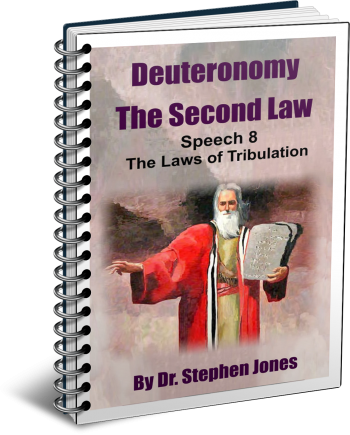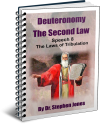Latest Posts
View the latest posts in an easy-to-read list format, with filtering options.

A commentary on the eighth speech of Moses in Deuteronomy 27-28. The book of Deuteronomy is a series of 12 speeches that Moses gave just before his death at the end of Israel's wilderness journey.
Category - Bible Commentaries

The final section of the Laws of Tribulation gives the climax of the curses for disobedience, beginning in Deut. 28:64,
64 Moreover, the Lord will scatter you among all peoples, from one end of the earth to the other end of the earth; and there you shall serve other gods, wood and stone, which you or your fathers have not known.
When Israel and Judah were divided after the death of Solomon, King Jeroboam of Israel set up two golden calves, one at Bethel and the other at Dan (1 Kings 12:28-30). Hence, the root cause of Israel’s captivity was established from the beginning of their history.
The prophet Hosea points to the calf at Bethel as well, for he was a prophet to the House of Israel. He accuses Israel of adultery with other gods (Hosea 7:4) and says that “a spirit of harlotry has led them astray” (Hosea 4:12; 5:4). For this reason, God will bring judgment upon this false god of Israel, saying in Hosea 8:5, 6,
5 He has rejected your calf, O Samaria… 6 A craftsman made it, so it is not God; surely the calf of Samaria will be broken to pieces.
In Hosea 10:5 the prophet calls Bethel by the name of Beth-aven, “house of vanity, lies, or emptiness.” Beth-aven was actually a town just east of Bethel itself, but Hosea links the two, as if Bethel, the “House of God,” had become the “House of Lies.”
Hosea 5:4, 6 also says,
4 Their deeds will not allow them to return to their God. For a spirit of harlotry is within them, and they do not know the Lord…. 6 They will go with their flocks and herds to seek the Lord, but they will not find Him; He has withdrawn from them.
What is this spirit of harlotry? How does it manifest in practical terms? Verse 11 gives the answer: “Because he was determined to follow man’s command,” that is, the traditions of men. Further, we read in Hosea 7:14,
14 And they do not cry to Me from their heart when they wail on their beds; for the sake of grain and new wine they assemble themselves. They turn away from Me. 15 Although I trained and strengthened their arms, yet they devise evil against Me. 16 They turn, but not upward, they are like a deceitful bow…
In other words, the Israelites did not lack religion, and they gave the appearance of repentance, but it was not “from their heart.” They do repent, or turn, but they repent of their righteousness, rather than of their sin, and hence, “devise evil against Me.”
This is why it is imperative to understand the law of God, for without knowing how to repent, even Christians in America will be incapable of true repentance. We all see how, in times of disaster, people flock to the churches for a short time. They pray, and they even attempt to repent, but their hearts are not changed, because they remain ignorant of the ways of God. “They turn, but not upward.” Further, “they wail on their beds,” but not on account of their sin. Instead, they are looking for “grain and new wine.” They want provisions, supplies, and prosperity, while holding on to their traditions of men. They seek God’s protection and blessing so that they might continue with their lawless beliefs and life style.
The ultimate curse of the law is that Israel would come to the place where she was fully incapable of repenting. In fact, Jer. 16:13 says,
13 So I will hurl you out of this land into the land which you have not known, neither you nor your fathers; and there you will serve other gods day and night, for I shall grant you no favor [chaniynah, “grace”].”
The prophet was expounding on Deut. 28:64, which we quoted earlier: “There you shall serve other gods, wood and stone, which you or your fathers have not known.” In other words, the ultimate curse of the law for Israel’s disobedience is that Israel would find herself in such bondage that she would be incapable of repenting. The real bondage is in the fact that she does not know how to repent. She is so completely convinced that the traditions of men are the word of God, it is impossible for her mind to be changed so that she may truly repent.
Such a situation would be disastrous, because the law would then bind them forever in this captivity to foreign nations. Fortunately, however, the prophet understood that God was sovereign and would take steps to change the situation Himself.
The prophet Hosea compares Israel to Jacob, showing that Jacob’s life prophesied of Israel as well. Jacob served as a slave to Laban in Syria (Aram), which is prophetically the same as Assyria (Hosea 12:12). His slavery was brought about by his deceit, as his name indicated. Yet his slavery ended after twenty years, and he returned to the land of Canaan to keep the appointed feasts (Hosea 12:9).
Jacob’s first stop was Mahanaim, which correlates with the feast of Trumpets. His second stop was at Penuel, which represents the Day of Atonement. His third stop was at Sukkoth, which is the feast of Tabernacles. To get the full story of this, see chapter 4 of my book, The Laws of the Second Coming.
Thus, God promises to take action by His sovereign will to change the hearts of the people, saying in Hosea 13:14,
14 I will ransom them from the power of Sheol; I will redeem them from death. O death, where are your thorns? O Sheol, where is your sting?
Paul quotes this in 1 Cor. 15:55. It is the only time that he speaks of Sheol (or Hades, in Greek). It is in the context of Christ delivering us from the power of Sheol. Paul broadens its application beyond Israel to include all men at the resurrection.
For the first 98 years of his life Jacob wrestled, first with his brother Esau and later with his uncle Laban. Jacob literally means a heel-catcher, because he was holding Esau’s heel when he was born. This became a Hebrew idiom for a deceiver, conniver, or a usurper. Jacob thought he was wrestling with Esau and Laban, but he was actually fighting God, for he did not understand the sovereignty of God.
Finally, however, God had mercy upon him and, and I believe the angel took the form of Esau. Toward daybreak, Jacob had an epiphany and saw that he was actually wrestling with an angel. In other words, the problem was not with Esau, but with Jacob. God had been using Esau to teach Jacob of His sovereignty.
This revelation brought him to repentance, and so His Peniel experience was his “Day of Atonement.” It prepared the way for him to go to Succoth in Gen. 33:17, a type of the feast of Tabernacles. Therefore, even as Jacob went to a Syrian captivity, so also did the House of Jacob go to Assyria. Even as Jacob was delivered through the feast day pattern, so also Israel today will be delivered.
Hosea sees Jacob as a type of the nation of Israel that sprang from his loins. The nation was as carnal as Jacob. The nation of Israel was not really Israel at all, but was Jacob, the carnal deceiver. No man is truly an Israelite except through spiritual seed of the Holy Spirit who begets Christ in us.
Our earthly fathers begot only carnal children. So also the nation of “Israel” was carnal. That nation, however, was destroyed in order to make room for a new nation under a New Covenant. Those who are begotten of God are beneficiaries of this New Covenant when they are brought to birth in the manifestation of the Sons of God.
The overcoming remnant has always enjoyed the favor (grace) of God, even though they have been persecuted and have had to endure the captivities brought about by the lawlessness of others. God has always used the remnant to carry the truth and to be a light in a dark world. Paul mentions this in Rom. 11:5, 7. They are the real inheritors of the promises, bearing witness to the blind and hardened hearts of Israel and also the world.
So the curse of the law in Deut. 28:64 does not apply to the overcomers, except in some of their physical circumstances. While the nation of Israel as a whole were blinded and locked into serving other gods, the overcomers by definition are those who serve God without such blindness. Jer. 16:13 says of the people in general, “I shall grant you no favor (grace),” but this does not apply to the remnant of grace (Rom. 11:5).